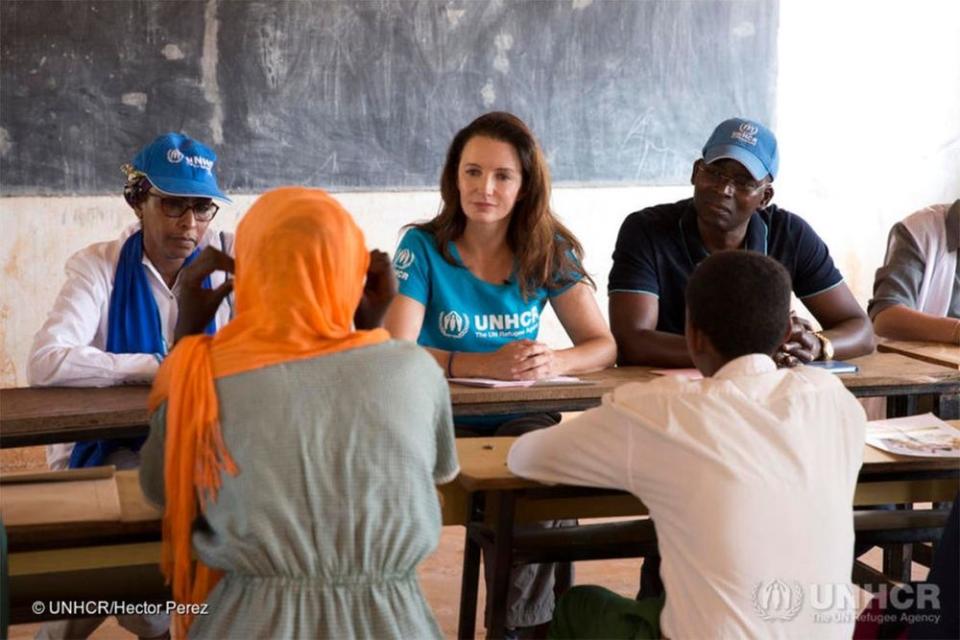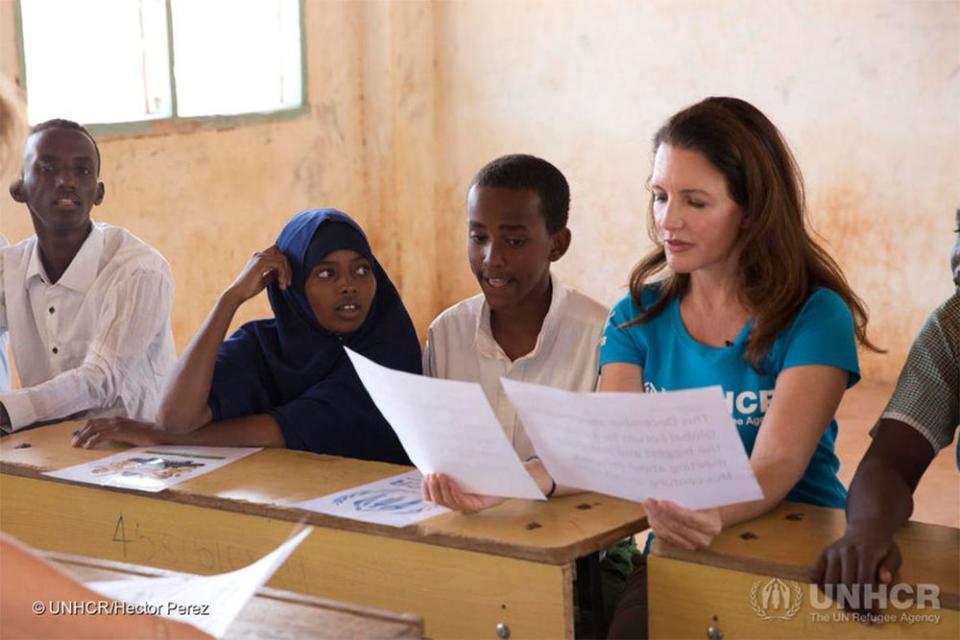Kristin Davis Details Her Powerful Experience Meeting Refugees in Kenya as UNHCR Goodwill Ambassador
Kristin Davis has been working with the United Nations Refugee Agency on a campaign called Everyone Counts, in the run up to the Global Refugee Forum in Geneva on Dec 17. In a PEOPLE exclusive, the Sex and the City actress, 54, has written about her experience meeting refugees in Kenya this summer. Read her powerful story below:
“Before I fled, I had three children. I have now fostered six more. I want to be able to help and give love to all of these young children……” – Rahmo.
I am visiting Dadaab as a Goodwill Ambassador for UNHCR, the UN Refugee Agency, which provides life-saving aid to refugees worldwide. The last time I was here in 2011, it was the largest refugee camp in the world. So vast as to be mistaken for a sprawling metropolis, the camp was built to respond to one of the worst humanitarian disasters of the decade. Three thousand people were arriving every day, fleeing homes in Somalia decimated by drought, famine and conflict, for Dadaab’s dusty streets.

Today the camp looks different. I’m told that 200,000 people have left, either returning to their homes or finding safety elsewhere. As Dadaab’s population has decreased, residents have taken the opportunity to create strong institutions and communities partly through programs that provide education and skills training. I visit Hormud primary school, one of 22 in Dadaab, where I meet bright and confident young students. I meet people at a vocational training centre who are learning new skills like computing, henna painting, film making and agricultural training. As always, I’m inspired by the resilience and vibrancy I see in these refugees who are determined to learn and train and be productive.
Although, I see there has been an improvement in the material circumstances of refugees living in Dadaab, I also bear witness to UNHCR’s struggle to secure sufficient resources and funding. While Dadaab requires $170 million to operate successfully, only 31% of this goal has been secured in 2019. This lack of funding translates into real consequences for refugees who are relying on these education and training programs to forge their way to a brighter future. At one education center, women describe the difficulties they face in their daily lives. They are unsure how their futures will play out if the center is closed.

I meet Rahmo in her home. As she sits on the floor among her six children, who tug at her veil, she proudly explains that she fostered all six of her children in Dadaab. Since 2008, three of her children have been resettled. Her eldest, Naima, currently lives in Canada, and I’m pleased to hear that she is doing well. Ayanle – ‘The Lucky One’ – is only seven years old.
He leaves the room as Rahmo begins her story:
On the 4th April 2012, Rahmo heard a car stop outside of her home. A thud, followed by a cry, and the car speeds off. It’s dark outside, and as Rahmo leaves her house, she notices a bundle by the road. Wrapped only in plastic packaging, surrounded by feral cats, lies a newborn baby boy. Rahmo takes off her veil, covers the child, and brings him inside her home. Arrangements are made to take the baby to a local hospital. The baby is cleaned up, and Rahmo stays in the ward beside him for 10 days. Rahmo is a registered foster mother in the camp, and since the hospital does not trust anyone else, responsibility falls upon her to look after the baby, alongside caring for her other children. She has done this now for six children and her kindness shines through when she kisses the children’s heads and hugs them as they cuddle up to her.

Over half of Dadaab’s refugee population are children. As I sit in Hormud primary school, Nyanhial Mai, a tall confident 16-year-old girl, tells me: “We need teachers, we need books and we need food”. These needs are so simple, yet so essential. Unfortunately, according to a newly released report from UNHCR, more than half of all school-age refugee children were not in school in 2018. All refugee children deserve to have the means and access to education and training they so desperately need.
In recognition of this need, UNHCR is calling for continued donor support and funding for Dadaab. Survival must only be a short-term goal. The real challenge remains providing opportunities – schools, workshops, agriculture — to enable Dadaab’s refugees to take control of their lives, to thrive and to prosper.
Can you imagine what it’s like for Rahmo and the millions of people who live in camps? What about the children who can’t go to school? We know that refugees are resilient largely due to the hardships they have faced. Now imagine how much refugees would be able to thrive if they had more support. UNHCR works all over the world protecting and supporting refugees but it cannot do this alone. Every one of us counts. Every one of us has a role to play, a voice to raise and an action to take.
We can all try to find solutions for refugees and the communities hosting them.
Currently, there are over 70 million displaced people around the world. This extraordinary situation requires an extraordinary response. UNHCR is hosting the Global Refugee Forum tomorrow. Now is the time to commit to action that will help every refugee – and the communities they are living in – to not just survive but to thrive. Everyone has a role to play in supporting refugees to access education, find work, live safely and achieve their dreams. Everyone counts, every voice, every action can make a difference. We all have a part to play.
#EveryoneCounts. To find out if you are an entrepreneur, an activist or a community builder, please take this quiz www.unhcr.org/playyourpart.

